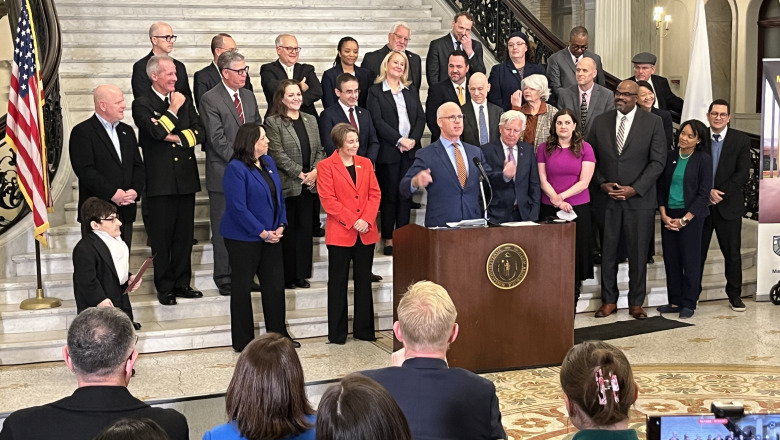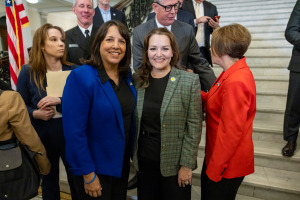
BOSTON — The Healey-Driscoll Administration released a first-of-its kind state report on post-college earnings for students who attended Massachusetts’ 29 public colleges and universities. The report shows that, five years after graduation, graduates of Massachusetts public colleges or universities make $20,000 to $30,000 more per year than their peers who did not pursue higher education. Those who pursue fields of study like health sciences, STEM and the trades saw the biggest earnings boost.
“The data is clear – Massachusetts degrees deliver,” said Governor Maura Healey. “When students graduate from our community colleges and public colleges, they get paid more, they have more opportunities for upward mobility, and they provide a skilled workforce for our employers. This is why, working with the Legislature, we have prioritized making college more affordable in Massachusetts. When we lower barriers to pursuing higher education, our students succeed and our economy succeeds.”
“As a proud public college graduate, this report shows what I have long known – public higher education in Massachusetts is key to lifelong career success,” said Lieutenant Governor Kim Driscoll. “Importantly, our public higher education graduates are more likely to stay in Massachusetts where they will continue their contributions to our economy and our communities. We’re proud to have made record investments in financial aid and will keep working to make college more affordable for everyone.”
These findings speak to the positive impacts of Governor Healey’s efforts to make public higher education more affordable in Massachusetts. Working with the Legislature, she has doubled state funding for financial aid – including offering free tuition and fees to Pell Grant eligible students at all public two- and four-year colleges and making community college free for everyone. In the 2023-2024 academic year alone, state financial aid programs saved Massachusetts students about $130 million on the cost of college. When students can afford to pursue higher education, they are more likely to make higher earnings throughout the course of their career and fill the needs of employers in in-demand fields.
This report follows the administration’s recent launch of “Go Higher,” a new brand and awareness campaign designed to increase exposure to higher education, improve the information pipeline, and build awareness of financial and institutional supports that help students see themselves in college. This also builds on efforts to spread awareness on financial aid and inspire students to see higher education as an option, such as the administration’s Financial Aid Road Show, and investments in My Career and Academic Plan (MyCAP) and MEFA Pathway that help middle and high school students with ongoing opportunities to plan for their academic, personal and career success in high school and beyond.
“Higher education brings students life-long skills, agency over their lives, and as this data shows, substantial personal financial rewards,” said Secretary of Education Dr. Patrick Tutwiler. “This report highlights that education supports each student’s individual economic mobility goals, as well as those of their family, local communities and economy. In Massachusetts, we remain committed to making higher education more affordable and accessible for all students – and lifting barriers so all students persist to graduation.”
“At Fitchburg State, we see every day what this report confirms: when you invest in public higher education, you change the trajectory of individual lives and entire communities," said Fitchburg State University President Donna Hodge. "Our students come to us with talent and determination. We meet them with access, high expectations, and a pathway to real economic mobility. These findings reinforce what matters most for our region and our Commonwealth: when students can afford to complete a high-quality degree, they graduate ready to earn more, contribute more, and build a stronger future for all of us.”
The release of the report, The Earnings Outcomes of Public Postsecondary Education in Massachusetts, kicks off the launch of new post-college earnings metrics that will be updated annually in the Department of Higher Education’s (DHE) Performance Measurement Reporting System (PMRS). PMRS is a public dashboard that tracks student success and other key performance indicators for each community college and state university in Massachusetts.
The report shows that median earnings five years after completing college are over $61,000 a year for those with associate degrees and $72,000 a year for bachelor’s degree completers. By comparison, students with a high school diploma who did not attend college earn about just over $42,000 annually. The earnings data does not include certain professions, such as self-employed individuals and military personnel, and detailed information about population measured and metrics used are available in the report.
The report includes earnings data by demographics and field of study, and it shows that while those with some college and no credential may see a slight earnings boost, earnings are far greater for those who complete a degree. This was a driving factor behind Governor Healey’s efforts to make community college free for anyone aged 25 and older in her first year in office – to make it easier for older students to return to school and complete their degree.
“At a time when many people are questioning the value of a college degree, I’m proud to share data that serves as a valuable public resource and highlights the personal finance growth that college can bring in just five years,” said Commissioner of Higher Education Noe Ortega.
“Earnings isn’t the only data point or goal that matters when it comes to choosing a college or major, but for many students and families, it’s a primary driver of their future plans, and the Board’s role includes making this information available,” said Board of Higher Education Chair Chris Gabrieli. "It is now up to us and the leadership of each campus to determine how to help more students gain even more economic mobility through our colleges."
“This report confirms that investing in higher education improves lives and bolsters our economy,” said Senate President Karen E. Spilka. “When we set out to transform higher education access in Massachusetts, this was our goal — and this data shows we’re achieving it. I applaud Governor Healey and her administration for implementing this program so effectively, the Senators who fought to make it a reality, and the students, faculty, staff, and campus leaders who are seeing these results in real time.”
“The House has been working with the Governor to make college more affordable, and now we're seeing real results,” said Representative Dave Roger (D-Cambridge). “Massachusetts students are saving money upfront and earning more after graduation. That's a win for students, families, and our economy.”
This initial earnings report is the beginning of DHE’s increased focus on measuring earnings outcomes, and the Department seeks to further examine a broader set of credentials, like certificates and master’s degrees, along with the impact of work-based learning and co-op experiences on post-college earnings.
Governor Healey has also prioritized career and technical education and workforce training. Earlier this year, the administration added eight new career technical education (CTE) programs in 16 high schools to support 900 more students. Governor Healey has also expanded career pathways for young people across the state – including increasing the number of Early College and Innovation Career Pathways programs in schools and helping more than 10,000 registered apprentices get hired since taking office.
